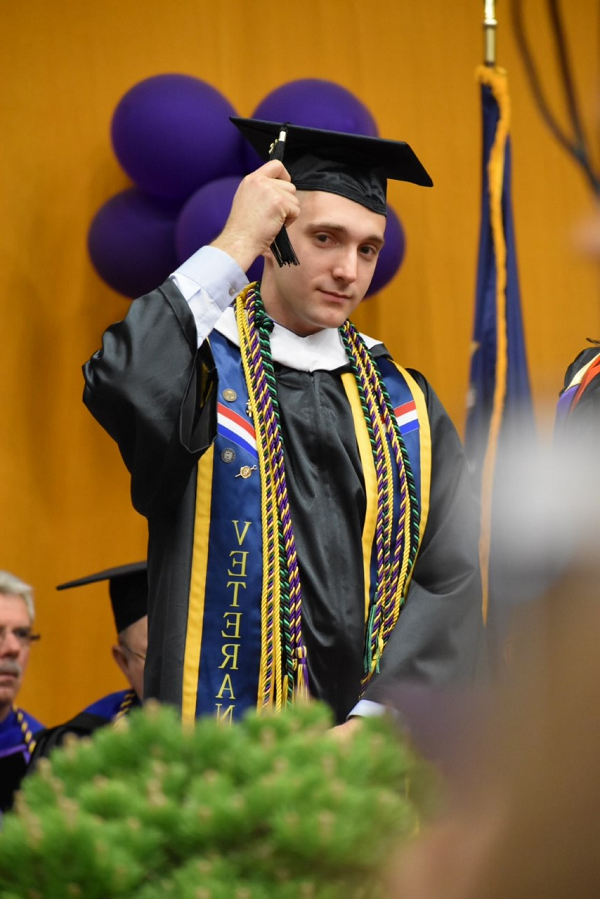Criminal Justice Studies
More than just the study of criminal behavior
Our society is vastly complex and imperfect. As a Criminal Justice Studies major, you'll learn to apply social science findings to the problems of criminal behavior in a practical and impactful manner. The program further develops your foundation in criminal justice by integrating elements of sociology, psychology, public policy, ethics, and international security.
Major
Double Major
Learn More
Minor
Core Courses:
- SOCI 110 Introduction to Sociology
- CRIM/SOCI 245 Crime and Society
- CRIM/SJST/SOCI 344 Sociology of Deviance
- POLS 332 Judicial Processes
- CRIM/SJST 340 Concepts of Penology
- CRIM 351 Seminar in Criminal Behavior
Electives:
- CRIM 322 Juvenile Justice
- CRIM 332 Focusing on Police
- CRIM 400 Special Topics in Criminal Justice
- CRIM 450 Independent Study
- CRIM 470 Field Work in Criminal Justice
- ENVS 220 Introduction to Geographic Information Systems
- PHIL 281 Ethics
- POLS/SOCI 230 Introduction to Data Analysis and Statistics
- POLS 242 Approaches to Law
- POLS 313 State and Local Politics
- POLS 316 American Constitutional Law and Politics
- POLS 355 Public Policy
- POLS 373 Terrorism and International Security
- PSYC 282 Social Psychology
- PSYC 342 Psychopathology
- SOCI 235 Socialization
- SOCI 242 Social Problems
- SOCI 253 Social Welfare Institutions
- SOCI 343 Race and Ethnicity
- SOCI/SJST 355 Power, Privilege, and Inequality
- SOCI/POLS 431 Research Design and Strategies
- SPAN 301 Advanced Conversation and Composition
In addition to fulfilling the requirements of the major in Criminal Justice Studies, as well as the College of Liberal Arts & Sciences general education requirements, you'll be required to complete the College's First Year Experience Program or Transfer Student Program.
Further, the Criminal Justice Studies major is required to attend at least two institutes. An institute is typically a half day session or workshop, offered at least once per year but usually once each semester. Institutes deal with specific issues facing professionals in the criminal justice area.
The interdisciplinary Criminal Justice Studies major attracts students who want to study the criminal justice system and key criminal justice actors, processes, and institutions. Courses in the major examine such topics as criminal behavior, social and governmental efforts at control, and practices developed to rehabilitate offenders. In general, students learn the application of social science findings to evaluate and analyze contemporary criminal justice issues. Courses in the major draw on a number of different disciplines in the social sciences, including Sociology and Political Science. The major also provides for practical experience through coursework that encourages students to apply classroom knowledge to actual situations in the field.
Learn more about Double Majors
Required Courses—24 credit hours (Grade must be C or higher):
- SOCI 110 Introduction to Sociology (Cross-listed as SJST 110)
- CRIM 245 Crime and Society (Cross-listed as SOCI 245) (Prerequisite: SOCI 110)
- CRIM 344 Sociology of Deviance and Criminal Behavior (Cross-listed as SOCI/SJST 344) (Prerequisite: SOCI 110)
- POLS 332 Judicial Processes
- CRIM 340 Concepts of Penology (Cross-listed as SJST 340) (Prerequisite: SOCI 245)
- CRIM 351 Seminar in Criminal Behavior (Prerequisite: SOCI 245 and Senior Standing)
Electives—20 credit hours needed (Grade must be C or higher):
- CRIM 332 Focusing on Police
- CRIM 400 Special Topics in Criminal Justice
- CRIM 450 Independent Study in Criminal Justice
- CRIM 470 Fieldwork in Criminal Justice Studies (Need minimum 2.5 overall GPA)
- ENVS 220 Introduction to Geographic Information Systems
- PHIL 281 Ethics
- POLS 242 Approaches to Law
- POLS 313 State and Local Politics
- POLS 316 American Constitutional Law and Politics (prereq: POLS 110)
- POLS 355 Public Policy
- POLS 373 Terrorism and International Security
- POLS 310 Executive Branch Institutions
- PSYC 282 Social Psychology (prereq: PSYC 110)
- PSYC 342 Psychopathology (prereq: PSYC 110)
- PSYC 330 Neuropsychology (prereq: PSYC 110)
- PSYC 210 Communication and Counseling Skills (prereq: PSYC 110)
- SOCI 230 Intro to Data Analysis (Cross-listed as POLS 230)
- SOCI 242 Social Problems
- SOCI 253 Social Welfare Institutions (Cross-listed as WGST 253)
- SOCI 343 Race & Ethnicity
- SOCI 355 Power, Privilege, and Inequality (Cross-listed as SJST 355)
- SOCI 431 Research Design and Strategies (Cross-listed as POLS 431)
- SPAN 301 Advanced Conversation and Composition
Institutes – Double Majors in the program are required to take at least two Criminal Justice Institutes.
Requirements for Criminal Justice Minor
Criminal Justice Studies minors must complete 20 credit hours including:
Core Courses:
- SOCI 110 Introduction to Sociology
- SOCI 245 Crime and Society
- CRIM 340 Concepts in Penology
Electives:
- CRIM 322 Juvenile Justice
- CRIM 332 Focusing on Police
- POLS 110 American Politics
- POLS 332 Judicial Processes
- SOCI 242 Social Problems
- SOCI 253 Social Welfare Institutions
- CRIM/SJST/SOCI 344 Sociology of Deviance
- SOCI/SJST 355 Power, Privilege, and Inequality
Criminal Justice Studies majors typically work within the fields of law enforcement, correctional counseling, court administration, human services, juvenile justice, and private security. In addition, many public and private agencies have related job openings for planners, researchers and analysts. Many of Alfred University’s Criminal Justice graduates attend law school or graduate school.
Examples of recent graduates include:
- Director – Allegany County Youth Court
- Research Assistant – Clinical Directors Network
- Correction Officer - NYSDOCS
- Investigator – Texas Dept of Family and Protective Services
- Case/Social Worker – St. Christopher’s Inc.
- Assistant Director-Youth Court - Allegany County Courthouse
- Agent - Federal Bureau of Investigation
- Anger Management Counselor – Beacon
- Child Support Legal Assistant - State of New Mexico
- Correctional Officer – Orleans County Sheriff’s Department
- Federal Agent – Department of Justice
- Forensic Case Manager – Steuben County Mental Health
- Engineer – Ocean House
- Bar Security – Balloons Restaurant and Nightclub
- Field Supervisor – NYC Dept of Youth and Community Development
Student Stories
Similar Programs
If you're interested in pursuing a career in the criminal justice field, you may find that double majoring, minoring in these programs, or moving to the graduate level could compliment your Criminal Justice Studies program and afford you additional career opportunities upon graduation:



